![]() 1st Battalion 22nd Infantry
1st Battalion 22nd Infantry ![]()
Charles W. Temple
22nd US Infantry
In 1899, while in the
Philippines with the 22nd Infantry Regiment,
Charles Temple wrote a letter home to his sister.
The letter was published in the Greenfield, MA
"Recorder" newspaper,
on Wednesday, February 21, 1900.
Below is a scan of the original
letter as published in the newspaper,
followed by a typed transcription of the letter.
The "Aggie" referred
to in the letter is Emilio Aguinaldo,
the leader of the initial Philippine insurrection against
American authority.
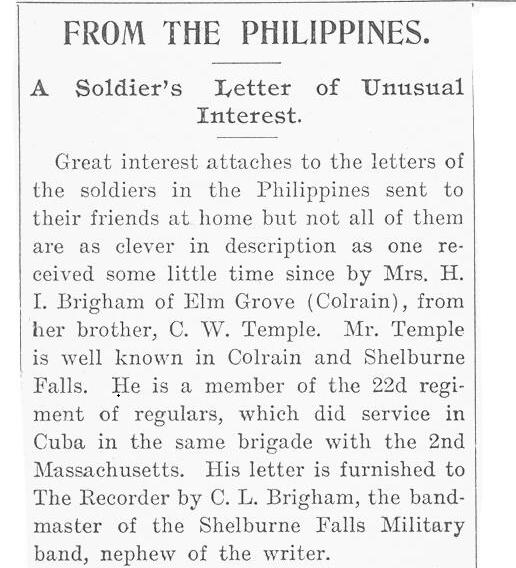
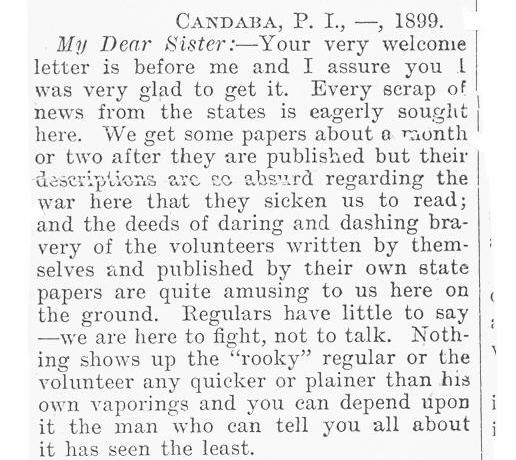
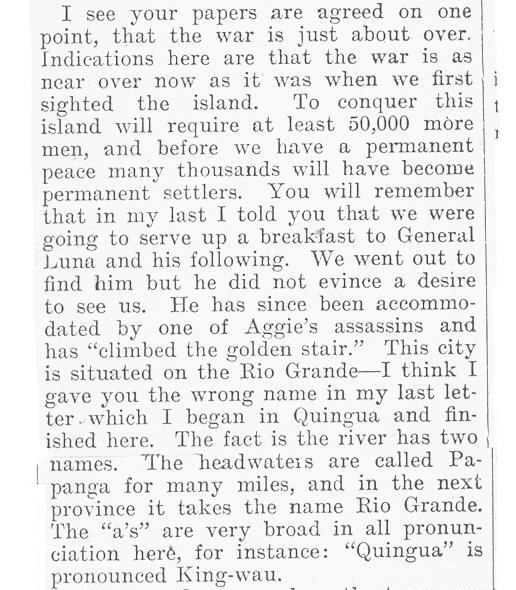
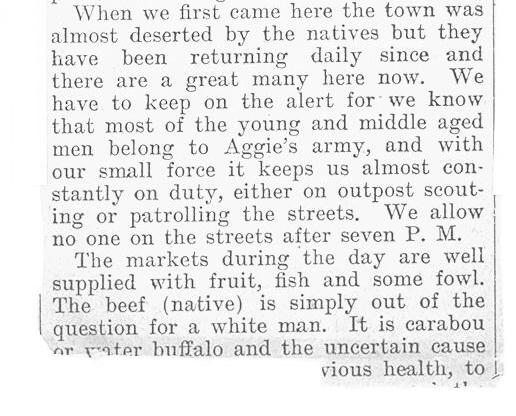
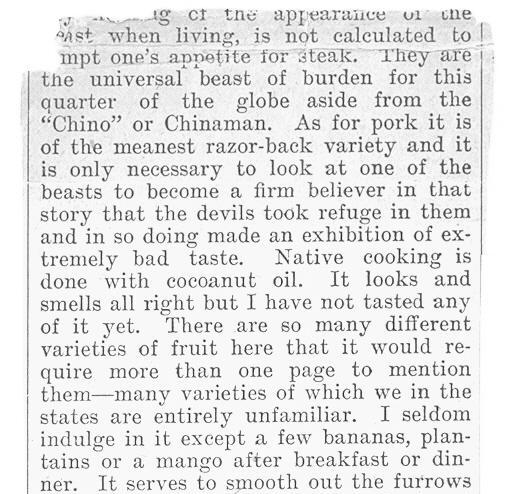
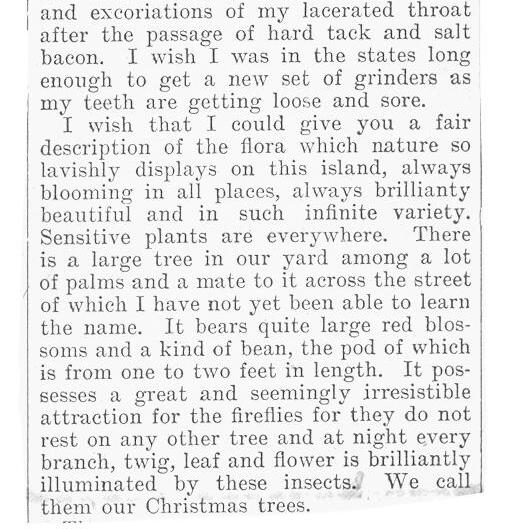
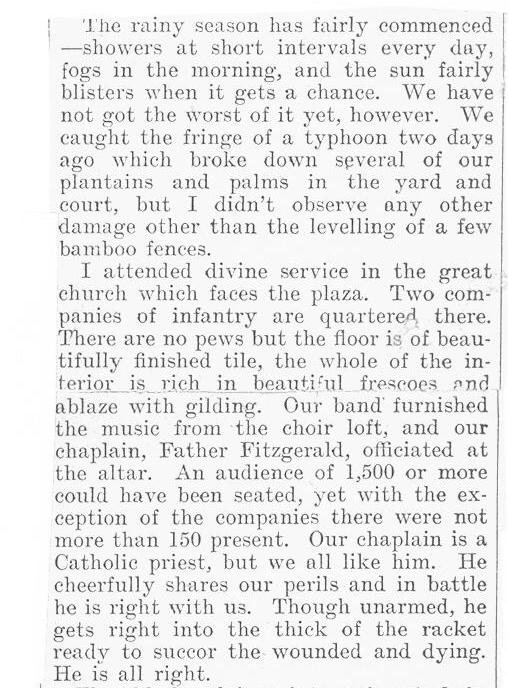
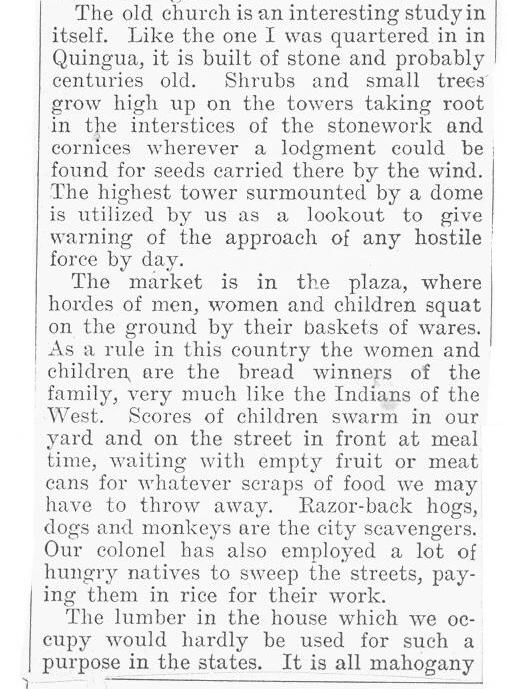
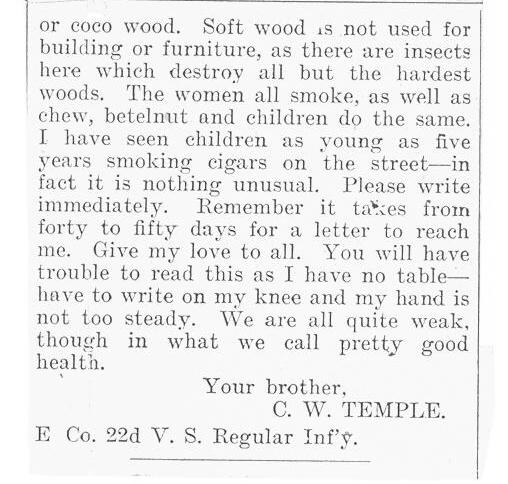
RECORDER: WEDNESDAY, FEBRUARY 21, 1900.
FROM THE PHILIPPINES.
A Soldier's fetter of Unusual Interest.
Great interest attaches to the letters of the
soldiers in the Philippines sent to their friends at home but not
all of them are as clever in description
as one received some little time since by Mrs. H. I. Brigham of
Elm Grove (Calrain), from her brother, C. W. Temple.
Mr. Temple is well known in Calrain and Shelburne Falls. He is a
member of the 22d regiment of regulars, which did service in Cuba
in the same brigade with the 2nd Massachusetts. His letter is
furnished to The Recorder by C. L. Brigham,
the bandmaster of the Shelburne Falls Military band, nephew of
the writer.
CANDABA, P. I., —, 1899. Dear
Sister:—Your very welcome letter is before me and I assure
you I was very glad to get it.
Every scrap of news from the states is eagerly sought here. We
get some papers about a month or two after they are published
but theirdescriptions are so absurd regarding the war here that
they sicken us to read; and the deeds of daring and dashing
bravery
of the volunteers written by themselves and published by their
own state papers are quite amusing to us here on the ground.
Regulars have little to say —we are here to fight, not to
talk. Nothing shows up the "rooky" regular or the
volunteer any quicker or plainer
than his own vaporings and you can depend upon it the man who can
tell you all about it has seen the least.
I see your papers are agreed on one point, that the war is just
about over. Indications here are that the war is as near over now
as it was when we first sighted the island. To conquer this
island will require at least 50,000 more men, and before we have
a permanent peace
many thousands will have become permanent settlers. You will
remember that in my last I told you that we were going to serve
up a breakfast
to General Luna and his following. We went out to find him but he
did not evince a desire to see us.
He has since been accommodated by one of Aggie's assassins and
has "climbed the golden stair."
This city is situated on the Rio Grande—I think I gave you
the wrong name in my last letter which I began in Quingua and
finished here.
The fact is the river has two names. The headwaters are called
Papanga for many miles, and in the next province it takes the
name Rio Grande.
The "a's" are very broad in all pronunciation here, for
instance: "Quingua" is pronounced King-wau.
When we first came here the town was almost deserted by the
natives but they have been returning daily since
and there are a great many here now. We have to keep on the alert
for we know that most of the young and middle aged men
belong to Aggie's army, and with our small force it keeps us
almost constantly on duty, either on outpost scouting or
patrolling the streets.
We allow no one on the streets after seven P. M.
The markets during the day are well supplied with fruit, fish and
some fowl.
The beef (native) is simply out of the question for a white man.
It is carabou
or water buffalo and the uncertain cause
...........vious health, to
.........of the appearance of the beast when living , is not
calculated to tempt one's appetite for steak.
They are the universal beast of burden for this quarter of the
globe aside from the "Chino" or Chinaman.
As for pork it is of the meanest razor-back variety and it is
only necessary to look at one of the beasts to become a firm
believer
in that story that the devils took refuge in them and in so doing
made an exhibition of extremely bad taste.
Native cooking is done with cocoanut oil. It looks and smells all
right but I have not tasted any of it yet.
There are so many different varieties of fruit here that it would
require more than one page to mention them—
many varieties of which we in the states are entirely unfamiliar.
I seldom indulge in it except a few bananas, plantains or a mango
after breakfast or dinner. It serves to smooth out the furrows
and excoriations of my lacerated throat after the passage of hard
tack and salt bacon.
I wish I was in the states long enough to get a new set of
grinders as my teeth are getting loose and sore.
I wish that I could give you a fair description of the flora
which nature so lavishly displays on this island, always blooming
in all places,
always brillianty beautiful and in such infinite variety.
Sensitive plants are everywhere. There is a large tree in our
yard among a lot of palms
and a mate to it across the street of which I have not yet been
able to learn the name. It bears quite large red blossoms and a
kind of bean,
the pod of which is from one to two feet in length. It possesses
a great and seemingly irresistible attraction for the fireflies
for they do not rest on any other tree and at night every branch,
twig, leaf and flower is brilliantly illuminated by these
insects.
We call them our Christmas trees. The rainy season has fairly
commenced —showers at short intervals every day,
fogs in the morning, and the sun fairly blisters when it gets a
chance. We have not got the worst of it yet, however.
We caught the fringe of a typhoon two days ago which broke down
several of our plantains and palms in the yard and court,
but I didn't observe any other damage other than the levelling of
a few bamboo fences.
I attended divine service in the great church which faces the
plaza. Two companies of infantry are quartered there.
There are no pews but the floor is of beautifully finished tile,
the whole of the interior is rich in beautiful frescoes and
ablaze with gilding.
Our band furnished the music from the choir loft, and our
chaplain, Father Fitzgerald, officiated at the altar.
An audience of 1,500 or more could have been seated, yet with the
exception of the companies there were not more than 150 present.
Our chaplain is a Catholic priest, but we all like him. He
cheerfully shares our perils and in battle he is right with us.
Though unarmed, he gets right into the thick of the racket ready
to succor the wounded and dying. He is all right.
The old church is an interesting study in itself. Like the one I
was quartered in in Quingua, it is built of stone and probably
centuries old.
Shrubs and small trees grow high up on the towers taking root in
the interstices of the stonework and cornices
wherever a lodgment could be found for seeds carried there by the
wind. The highest tower surmounted by a dome is utilized by us as
a lookout
to give warning of the approach of any hostile force by day.
The market is in the plaza, where hordes of men, women and
children squat on the ground by their baskets of wares.
As a rule in this country the women and children are the bread
winners of the family, very much like the Indians of the West.
Scores of children swarm in our yard and on the street in front
at meal time, waiting with empty fruit or meat cans
for whatever scraps of food we may have to throw away. Razor-back
hogs, dogs and monkeys are the city scavengers.
Our colonel has also employed a lot of hungry natives to sweep
the streets, paying them in rice for their work.
The lumber in the house which we occupy would hardly be used for
such a purpose in the states. It is all mahogany or coco wood.
Soft wood is not used for building or furniture, as there are
insects here which destroy all but the hardest woods.
The women all smoke, as well as chew, betelnut and children do
the same. I have seen children as young as five years
smoking cigars on the street—in fact it is nothing unusual.
Please write immediately.
Remember it takes from forty to fifty days for a letter to reach
me. Give my love to all.
You will have trouble to read this as I have no table—have
to write on my knee
and my hand is not too steady. We are all quite weak, though in
what we call pretty good health.
Your brother.
C.W. TEMPLE
E Co. 22d U.S. Regular Inf'y
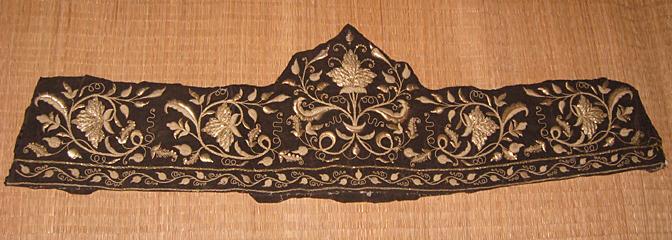
A piece of ornately embroidered cloth
which was a part of a flamenco dancer's dress,
brought home from the Philippines by Charles W. Temple.
**********************
Home | Photos | Battles & History | Current |
Rosters & Reports | Medal of Honor | Killed
in Action |
Personnel Locator | Commanders | Station
List | Campaigns |
Honors | Insignia & Memorabilia | 4-42
Artillery | Taps |
What's New | Editorial | Links |